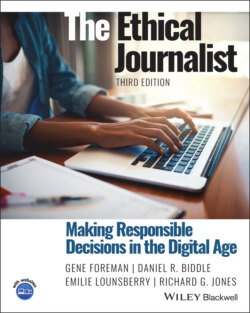Читать книгу The Ethical Journalist - Gene Foreman - Страница 32
The Origins of Ethics Theory
ОглавлениеTracing the origins of ethical thinking underscores the importance of ethics as a society’s bedrock foundation. Ethical theory evolved in ancient societies as a basis for justice and the orderly functioning of the group, a purpose it still serves today.
A familiar example is the Ten Commandments from the Judeo‐Christian heritage, which sets forth the rules that would govern the Hebrews freed from Egyptian captivity in about 1500 bce. Among other things, they were admonished not to kill, steal, or lie.
An earlier example is Babylonia’s Code of Hammurabi. The laws promulgated by the ruler Hammurabi (1728–1646 bce) directed that “the strong might not oppress the weak” and outlined a system of justice that meant “the straight thing.” Hammurabi’s justice centered on rules governing property and contracts. His code, however, was not without flaws. A surgeon who caused the blindness of a man of standing would have his hand cut off, but if he caused the blindness of a slave, he could set things right by paying the owner half the value of the slave. 7
Ancient Greece gave the English language the word ethics, which is derived from the Greek ethos, meaning character. The citizens of Athens created the concept that an ethical reasoning system should be based on an individual’s virtue and character, rather than rules. Because virtue was to be practiced as a lifelong habit, a Greek citizen would be honest because it would be unthinkable to be dishonest. The virtue philosophers of Athens – Socrates (469–399 bce), Plato (427–347 bce), and Aristotle (384–322 bce) – believed that “the individual, in living a virtuous life, would form part of an overall virtuous community.” 8
Socrates, who made the famous declaration that “the unexamined life is not worth living,” established a line of questioning intended to provoke thought. He “roamed Greece probing and challenging his brethren’s ideas about such abstract concepts as justice and goodness,” ethics scholar Louis A. Day wrote. “This Socratic method of inquiry, consisting of relentless questions and answers about the nature of moral conduct, has proved to be a durable commodity, continuing to touch off heated discussions about morality in barrooms and classrooms alike.” 9
Ethical thinking evolved in societies around the world. A common thread is found in how various cultures articulated what is best known as the Golden Rule. This rule defines the essence of being an ethical person, which is to consider the needs of others. Today we state it as “Do unto others as you would have them do unto you.” The author Rushworth M. Kidder traced the “criterion of reversibility”:
This rule, familiar to students of the Bible, is often thought of as a narrowly Christian dictum. To be sure, it appears in the book of Matthew: “All things whatsoever ye would that men should do to you, do ye even so to them: for this is the law and the prophets.” But Jews find it in the Talmud, which says, “That which you hold as detestable, do not do to your neighbor. That is the whole law: the rest is but commentary.” Or, as it appears in the teachings of Islam, “None of you is a believer if he does not desire for his brother that which he desires for himself.” … The label “golden” was applied by Confucius (551–479 bce), who wrote: “Here certainly is the golden maxim: Do not do to others which we do not want them to do to us.” 10
Some laws are based on ethical precepts, such as those forbidding murder and stealing, and civil lawsuits can be filed to require someone to live up to contractual promises. However, ethics and law emphatically are not the same. Law sets forth minimal standards of conduct. Law states what a person is required to do; ethics suggests what a person ought to do. An ethical person, as Michael Josephson says, “often chooses to do more than the law requires and less than it allows.” 11 Potter Stewart, a former US Supreme Court justice, put it this way: “Ethics is knowing the difference between what you have a right to do and what is right to do.”
Some laws of the past are universally regarded today as morally wrong. The Supreme Court, in Dred Scott v. Sandford (1857), upheld the principle of slavery and, in Plessy v. Ferguson (1896), the principle of racial segregation. Courageous leaders like Martin Luther King Jr. defied state segregation laws in the South in the civil rights movement of the 1950s and 1960s.Theirs were acts of civil disobedience, in which the person who disobeys is convinced of the laws’ immorality, is nonviolent, and is willing to pay the price for disobedience. 12
In the late 1940s trials of Germans accused of war crimes, the Nuremberg tribunals representing the victorious Allied powers established the principle that the crimes cannot be excused on the grounds that they are committed under orders of the state. An individual has the moral duty to reject blatantly criminal orders.
